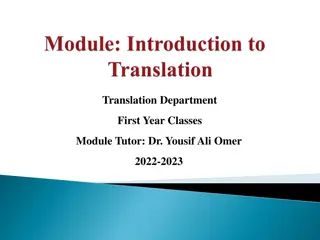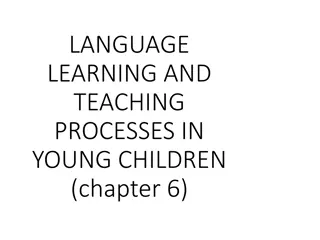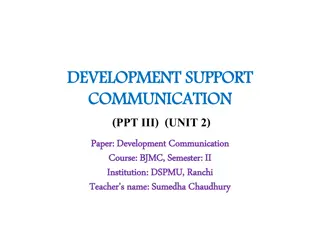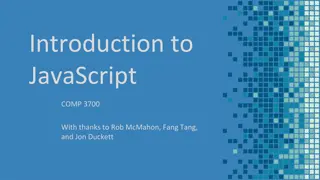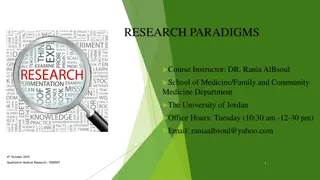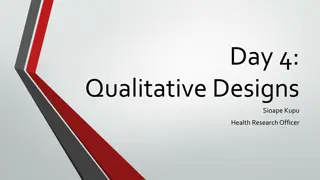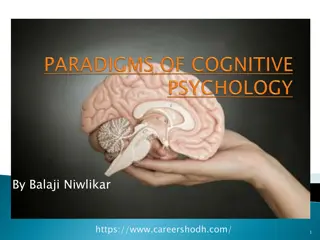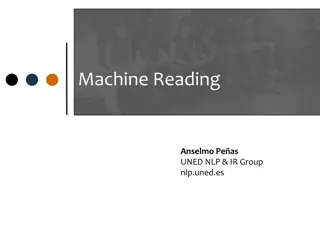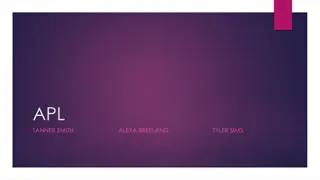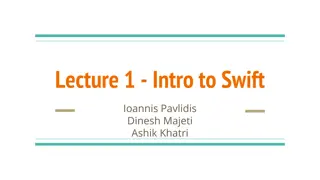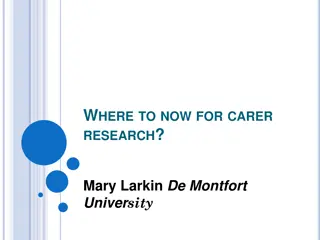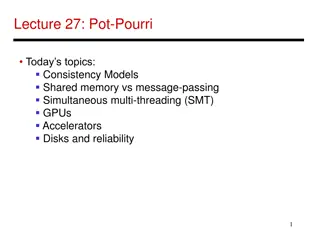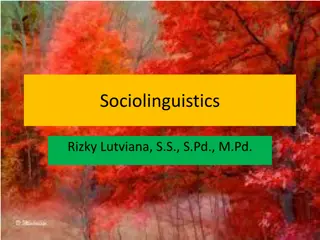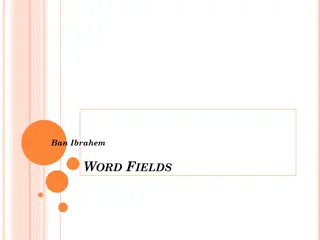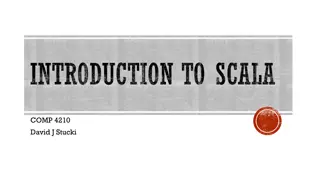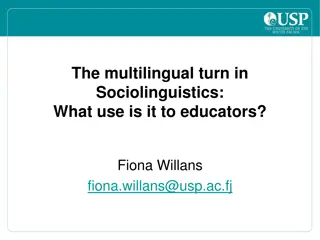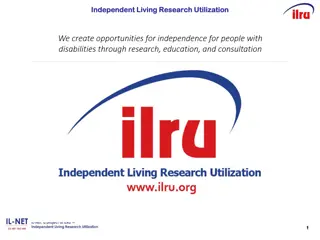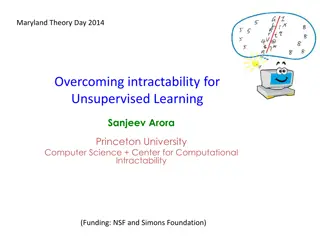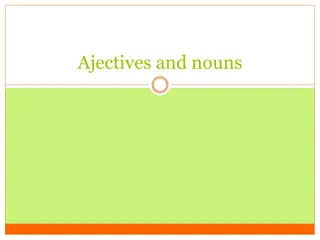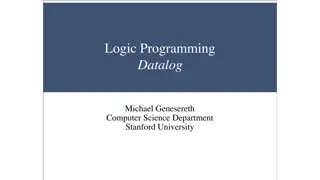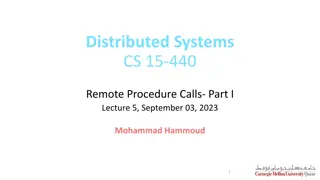Career Opportunities and Challenges in Translation & Interpreting Pedagogy Post-Pandemic
The APTIS 2022 conference explores new avenues in Translation and Interpreting (T&I) pedagogy amidst a changing landscape. Dr. Bego A. Rodriguez highlights emerging roles for T&I graduates. The context reveals a decline in language learning in the UK, impacting the Language Service Industry. The UK'
1 views • 13 slides
Language Study Community – Enhance Your Language Skills
Joining a Language Study Group is a fantastic way to take your language learning to the next level. By leveraging the power of Group Study, you can immerse yourself in the language, enhance your understanding, and build confidence in your speaking abilities. Read full article \/\/explainlearning.com
1 views • 3 slides
Academic Language Demands and Supports in Instructional Planning
Academic Language Demands and Supports are crucial in educational settings to ensure comprehension and usage of language by students. This content discusses embedding language demands in lesson plans, providing language supports, and peer review activities to enhance academic language skills. The fo
6 views • 10 slides
The Significance of Media in Language Learning
Media plays a crucial role in language learning by raising awareness of the ideology behind linguistic structures and providing valuable information on society and culture. Linguists are drawn to media language for research purposes and to understand its impact on language use and attitudes. Media s
12 views • 5 slides
Translation: Key Concepts and Definitions
Translation involves transferring written text from one language to another, while interpreting deals with oral communication. Etymologically, the term "translation" comes from Latin meaning "to carry over." It is a process of replacing an original text with another in a different language. Translat
12 views • 76 slides
Insights into Theoretical English Grammar
The theoretical English grammar delves into the subject matter of grammar, including systemic conceptions, grammatical forms, categories, paradigms, and morphological means. It discusses the constituent parts of language – phonology, lexicology, and grammar. The grammatical structure covers morpho
10 views • 26 slides
Language and Communication in Society: Understanding Interactions
Explore the intricate relationship between language and society through lectures focusing on language in interaction, power dynamics, language contact and change, public space discourse, linguistic landscaping, and more. Delve into the shift from structural linguistics to societal communication, red
6 views • 28 slides
Language Learning and Teaching Processes in Young Children
Development of language in young children is influenced by various factors such as their cultural and linguistic environment, unique characteristics, and interactions with adults. Optimal language development requires language stimulation from the environment. Varied cultural practices impact langua
1 views • 51 slides
Evolution of Development Communication Paradigms and Alternative Paradigm
Development Communication explores the stages of creating a plan, implementing strategies, and ownership paradigms in development projects. Emphasis is on participatory approaches, community empowerment, and inverting top-down processes. The concept of Alternative Paradigm emerges to counter the ali
2 views • 6 slides
Introduction to JavaScript: History, Features, and Functional Paradigm
JavaScript, initially developed by Netscape Communications in 1995, has evolved into a versatile language with support for functional programming paradigms. From its history with Netscape Navigator to its support for prototypal inheritance and functional features like higher-order functions and API
3 views • 18 slides
Enhancing Language Learning Across the Curriculum in B.Ed. 1st Year Course
Language Across the Curriculum (LAC) emphasizes that language learning should occur across all subjects, not just in language classrooms. It highlights the importance of incorporating language development into every learning activity, fostering multilingualism in schools. Language plays a crucial ro
3 views • 34 slides
Research Paradigms in Qualitative Medical Research
Delve into the world of research paradigms in qualitative medical research with a focus on the key differences between objective and subjective research, the meaning of research paradigms, components of research paradigms, types of research paradigms, and how paradigms guide the selection of researc
1 views • 42 slides
Qualitative vs. Quantitative Approaches in Health Research
Exploring the different methodologies, paradigms, and methods used in health research, this content highlights the distinction between qualitative and quantitative designs. It covers research questions, aims, objectives, hypotheses, and various quantitative approaches such as experimental and observ
1 views • 28 slides
Paradigms of Cognitive Psychology
Cognitive psychology, a branch of psychology, delves into mental processes like thinking, perceiving, remembering, and learning. This field views individuals as information processors, with paradigms guiding research methodologies. Key approaches include Information Processing, Connectionist, Evolut
0 views • 18 slides
Formal Semantics of Programming Languages: From Lambda Calculus to Separation Logic
Explore the foundational concepts of formal semantics in programming languages, covering Lambda Calculus, Untyped and Simply-typed languages, Imperative languages, Operational and Hoare logics, as well as Separation logic. Delve into syntax, reduction rules, typing rules, and operational semantics i
8 views • 14 slides
Machine Reading and Language Understanding at UNED
Delve into the realm of machine reading and language understanding with insights from UNED's NLP & IR Group. The discussion covers the significance of understanding language, the role of knowledge in comprehension, testing acquired knowledge, and the evolution towards machine-operable representation
0 views • 121 slides
Advancements in Open Question Answering Over Text and Tables
Open question answering over tables and text is a challenging area in natural language processing. Various paradigms such as text-based QA, table/KB-only QA, and combined text and table QA have been explored. Incompleteness in answering specific questions like identifying the runner-up song on Billb
0 views • 24 slides
APL - A Functional Language with Array Paradigms
APL, named after the book "A Programming Language Paradigms," is a functional language with a focus on array manipulation. Developed in the 1960s by Kenneth E. Iverson, it has had a significant impact on the development of spreadsheets and computer math packages. APL operates with chains of monadic
0 views • 11 slides
Innovations in Social Work Research: Emerging Topics and Paradigms
Explore the latest trends in social work research at the 2016 Joint World Conference on Social Work, Education, and Social Development. Discover topics such as global change, indigenous concerns, and migration issues. Delve into research paradigms, methodologies, and challenges, including the impact
0 views • 8 slides
Speech and Language Developmental Milestones: A Bilingual/Multilingual Perspective
Speech and language developmental milestones are crucial for children, regardless of their home language. These milestones encompass receptive language, expressive language, pragmatics, and articulation and phonology. Understanding how a child hears and talks from birth to one year is essential, as
1 views • 23 slides
Introduction to Swift Programming Language
Swift is a modern programming language known for its evolution and development since 2010. It is a general-purpose, compiled language that supports both object-oriented and functional programming paradigms. Key features include constants, variables, operators, strings, optionals, and control flows l
0 views • 19 slides
Implementing Strategic Areas for Non-Communicable Disease Prevention
Implementation of national prevention and control programs for non-communicable diseases is crucial for sustainable healthcare systems. Collaborating with multidisciplinary groups and shifting advocacy paradigms towards human rights and social determinants of health are essential. A transformation i
1 views • 20 slides
Carer Research Trends in the UK: A Critical Analysis
Research conducted at De Montfort University explores the evolution of carer research paradigms in the UK since 1995, aiming to critique the relationship between research/theory and our understanding of carers. Through multi-stage reviews and analysis, the study delves into key dimensions of carer r
0 views • 26 slides
Memory Consistency Models and Communication Paradigms in Computer Systems
Memory consistency models define the ordering of writes and reads in computer systems. Coherence ensures write propagation and serialization, while consistency models guide programmers in writing correct programs. Shared-memory and message-passing are two communication paradigms with different appro
0 views • 31 slides
Introduction to Language Technologies at Jožef Stefan International Postgraduate School
This module on Knowledge Technologies at Jožef Stefan International Postgraduate School explores various aspects of Language Technologies, including Computational Linguistics, Natural Language Processing, and Human Language Technologies. The course covers computer processing of natural language, ap
0 views • 27 slides
Sociolinguistics: Language Variation and Social Factors
Sociolinguistics delves into the study of language variation influenced by social factors, examining the relationship between language and its social context. It explores various aspects like standard pronunciation, language choice, speech acts, language components, language variety, and factors suc
0 views • 73 slides
Assembly Language Programming for Computing Layers
Assembly language is a low-level programming language that enables direct interaction with a computer's hardware components. This content explores the fundamentals of assembly language, the relationship between human-readable machine language and binary code, an assembly language program for multipl
1 views • 31 slides
Structuring Vocabulary in Language: Semantic and Psycholinguistic Perspectives
The vocabulary of a language is not just a random collection of words. It is structured linguistically and psycholinguistically, with different levels of organization. This text explores linguistic structures in the lexicon, focusing on semantics and sense relations. It delves into taxonomic and mer
0 views • 49 slides
Scala: A Multi-Paradigmatic Language
Scala is a powerful language designed by Martin Odersky that seamlessly blends object-oriented and functional programming paradigms. With origins in the 1930s and a release in 2004, Scala runs on the JVM, offering features like type inference, first-class functions, and full object orientation. Its
0 views • 9 slides
Language Anxiety in Foreign Language Learning and Teaching
Explore the impact of language anxiety on students and teachers in foreign language learning and teaching contexts through insights from Dr. Christina Gkonou's research. Delve into the theoretical background, implications for language education, and real-life experiences shared at the Essex Language
0 views • 25 slides
Linguistics: Grammar, Pronouns, and Language Evolution
Delve into the world of linguistics with a focus on grammar, pronouns, and the evolution of language. Discover the nuances of English, French, and German languages, explore verb paradigms in Latin, and ponder the intricacies of language use versus language prescription.
0 views • 32 slides
Top Ten All-Time Stupid Quotes
Explore a collection of historical quotes demonstrating misguided predictions and beliefs, from dismissing the need for computers to doubting the significance of inventions like the telephone and moon landing. Reflect on the impact of self-paradigms and paradigms of others as discussed in the text,
0 views • 12 slides
Computer Programming Principles
Dive into the world of computer programming, covering high-level and machine languages, compilers, interpreters, writing programs, top-down design, and the array of programming languages available. Understand the essentials of building code to control computers, the diversity of programming language
0 views • 23 slides
The Multilingual Turn in Sociolinguistics: Implications for Educators
Exploring the multilingual context in Vanuatu, this article delves into the historical evolution of language policies and their impact on education. It discusses the diverse language landscape in Vanuatu, the challenges faced by educators, and the shifting paradigms in language instruction over time
0 views • 27 slides
Evolution of Independent Living Movement
Delve into the core of the Independent Living Movement that integrates consumer-driven services for a holistic experience. Explore the impact of history, philosophy, and social context on the movement, led by influential figures such as Ed Roberts and Wade Blank. Learn about the paradigm shift towar
0 views • 34 slides
Hebrew Verb Forms: Qal Qatal and Piel Qatal Paradigms
Explore the rules and nuances of using definite articles with prepositions, verb forms, and verb charts in Hebrew. Learn how to identify and read the Qal Qatal and Piel Qatal paradigms, and understand the significance of prepositions with the definite article. Dive into verb charts for Qatal and dec
0 views • 25 slides
Unsupervised Learning Paradigms and Challenges in Theory
Explore the realm of unsupervised learning as discussed in the Maryland Theory Day 2014 event. Overcoming intractability for unsupervised learning, the distinction between supervised and unsupervised learning, main paradigms, NP-hardness obstacles, and examples like the inverse moment problem are co
0 views • 38 slides
Adjectives and Nouns: Gender, Form, and Declension
Learn how to connect nouns with adjectives by considering gender, form, and declension. Understand the importance of matching genders and cases, and practice with examples. Explore paradigms for different adjectives and nouns, declining them accordingly. Enhance your language skills in forming corre
0 views • 12 slides
Unraveling the Complexities of Hex Game Encoding Paradigms
Hex, a strategic two-player game invented by John Nash and Piet Hein, poses intriguing challenges for mathematicians and computer scientists. This article delves into different paradigms for encoding Hex game rules, exploring the performance of each. From basic observations to advanced approaches li
0 views • 20 slides
Distributed Systems: Remote Procedure Calls and Communication Paradigms
Explore the fundamentals of distributed systems, focusing on remote procedure calls, communication paradigms, and middleware layers. Learn how entities communicate in distributed systems, classification of communication paradigms, and the role of middleware in facilitating communication between appl
0 views • 28 slides




